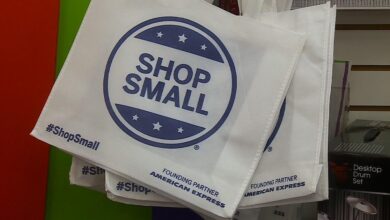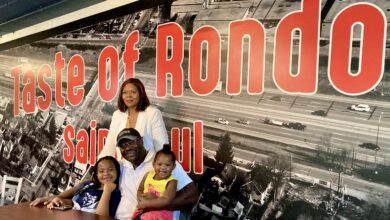Black Business Spotlight: Black Garnet Books


A community-focused bookstore and a culturally welcoming space
When Dionne Sims (DS) decided to launch Black Garnet Books in the summer of 2020, her life was headed in a totally different direction. “I was working in the tech industry in 2020,” said the 30-year-old Sims of her journey to becoming a Black bookstore owner.
“After the murder of George Floyd, I took a break to focus on community work. I was getting involved in protests, rallies and cleanups—things like that. During that break from work, I realized that’s what I really want to be doing. I wanted to be in community with people and connecting with them face-to-face, versus just sitting in an office in the suburbs working all day.”
Before moving into Black Garnet’s current brick-and-mortar space on University Ave. West in St. Paul this past October—where she has four employees—she operated as an online bookstore, occasionally opening at pop-up sites or other locations around the Twin Cities, including sharing space with a local tattoo parlor.
MSR: What inspired you to start your business?
DS: I was looking for a Black-owned bookstore to support, and I realized that there weren’t any in Minnesota. I tweeted that [a Black bookstore] didn’t exist here. That became my dream, to start a Black-owned bookstore here. Everyone was like, ‘Yeah, you should do that.’ And so, it all just kind of snowballed from there.
– ADVERTISEMENT –
MSR: What were you doing before the bookstore?
DS: I was a user experience designer. I was working at different tech companies around the Twin Cities.
I didn’t really know how to get into that kind of work I wanted to do. I didn’t know if I wanted to be a professional organizer. I just knew that I wanted to work in the community. At the same time, I was also looking for a way to decompress from how stressful that time was. And for me reading is a big way for me to decompress.
MSR: How does your business impact the community?
DS: Bookstores are communal hubs. It’s a place where people know that they can come in, where events are being held that are going to be of interest to them, especially with independent bookstores. Since they’re so hyper-local, they can be really specific in catering to the needs of the neighborhood, as well as the needs and desires of [other] people in the city.
– ADVERTISEMENT –
For us, we’re a queer space. The majority of our employees are queer. I’m queer. Especially during pride month, but also all months, we like to be able to let people know that this is a safe place to come and get those books that are being banned across the country. It’s just a welcoming space.
MSR: What’s your bestselling book right now?
DS: “All About Love,” by bell hooks.
MSR: Do you sell anything besides books?
DS: Besides books, we also have stationery, puzzles, home goods like mugs, candles, socks, t-shirts, tote bags—all that kind of stuff. But then we also do events every month. We give people the opportunity to meet authors, both local authors and national authors.
– ADVERTISEMENT –
We also do events that are not book-focused. We did speed-dating last month, and we’re going to do that again. We have an art fair that we regularly host and have events that are designed just to bring people into the space so they can be together, and not necessarily focused on selling books.
MSR: What has been your biggest challenge in owning a business?
DS: I think the biggest challenge is money. I think that there are a lot of people who start businesses either with income that they already have, or because they have networks that are highly funded. I think for Black people—in a state where there is such a large financial gap between White people and Black people—it can be really difficult for us to get the funding that we need. And the kind of funding that’s sustainable.
I think after the initial excitement of the bookstore died down, there’s always that period where you’re like, ‘Okay, I have to figure a way to keep the doors open.’ Luckily, I have connections to the City where I was able to get support and receive a working grant from the City.
But even that wasn’t extremely accessible. And it’s not something that I would consider accessible to most people, because they either don’t know that it exists, or because it’s just so much work to get a grant. You kind of need someone who’s focused on that full time. I think that was probably the hardest part.
– ADVERTISEMENT –
MSR: Did you apply for any business loans?
DS: I applied for one bank loan, just a small one. It’s been paid off already. I know that one of the biggest things that causes small businesses to close is debt and not being able to claw your way out once you’re in it.
Those loans seem great upfront, but then a year later you’re like, ‘Oh my God. A big chunk of my income is just going into paying back this initial loan.’ It really sinks a lot of people.
I’ve been really deliberate about trying not to take out any loans. I mean, it’s hard. It’s stressful since you aren’t relying on loans. And it’s really kind of week-to-week. But it’s definitely worth it, to not have that stress of debt hanging over us.
MSR: What has been the most rewarding part of owning your business?
DS: I love being able to see people’s joy in finding a book that they actually feel that they relate to. That’s probably my favorite part.
MSR: How is your bookstore different from other bookstores?
DS: Our bookstore is different because we only carry books by Black, Indigenous, or other people of color—every single book. If you buy a book here, you’re supporting a person of color no matter what book you buy, which I think is really cool.
Other bookstores, they mostly try and carry books that are on the bestseller lists. We have those big bestsellers too. But here, it’s also a bunch of local authors of color that you may not have heard of. Here, we have authors that definitely aren’t getting the kind of a big marketing push that maybe White authors are getting. I think that that’s something that’s really special about us. And we can still fill all of our bookshelves, which I think is something that 20 years ago wouldn’t have been possible.
MSR: What’s your vision for your business? What does success look like for you?
DS: I definitely want to do more community-focused events that aren’t just specifically about book selling. People can still buy books at them, which I think is really cool, but it’s also just fun. I want to bring the fun back into bookstores that you don’t really get with places like Barnes and Noble, and that you definitely don’t get with Amazon, since it’s just online.
The joy in having an indie bookstore is that you can do whatever you want with it. It exists to meet the desires and wants of the people who come to it. So, we have that freedom to do things like speed dating. We have the freedom to do quirky little art fairs, or partner up with breweries and have adult book fairs, which we’re going to host in August.
We do more than just sell books. We help create spaces where people can come together. So, I want to do a lot more of those kinds of events.
MSR: What advice would you give to an aspiring entrepreneur?
DS: Really talk to people. When you’re starting something new and you’re not sure if it’s going to work, there’s a lot of fear involved. That can make you feel like, ‘I’m going to keep this dream or this goal to myself and try to do all the planning and everything behind the scenes, just in case I fail, and it doesn’t work out.’
I was scared the entire time. But it’s easier to be scared out loud and openly than it is to do it internally. Plus, it gives people opportunities to help and support you in ways that you probably weren’t even thinking of. There were a lot of things that I didn’t know I needed help with until someone was like, “I can help you out with this.” Or they offered their services.
That kind of stuff won’t happen if you aren’t talking to people and being honest and open. You have to be vulnerable to be open about something. But it’s really the only way to get things done in a good amount of time, and to also get it done in a way that doesn’t like kill you with the stress of it.
MSR: How can people find out about your events?
DS: We have put all of our events on our website. We also put them on social media, on Instagram (@blackgarnetbooks). People can also sign up for our newsletter, either online or through social media.
MSR: What would you like to add that has not been covered?
DS: We are excited to just sell books to folks, and we’re excited to get to know and meet community members here and through our events that we do across the Twin Cities. I hope people come visit or they stop by one of our events.
Black Garnet Bookstore is located at 1319 University Avenue West in Saint Paul. For more information, call (651) 641-7515, or go to www.blackgarnetbooks.com.
Support Black local news
Help amplify Black voices by donating to the MSR. Your contribution enables critical coverage of issues affecting the community and empowers authentic storytelling.
























































